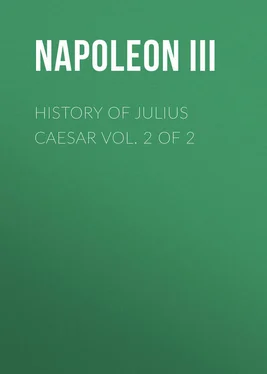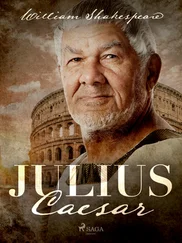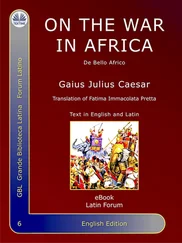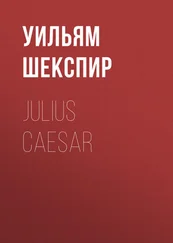Napoleon III - History of Julius Caesar Vol. 2 of 2
Здесь есть возможность читать онлайн «Napoleon III - History of Julius Caesar Vol. 2 of 2» — ознакомительный отрывок электронной книги совершенно бесплатно, а после прочтения отрывка купить полную версию. В некоторых случаях можно слушать аудио, скачать через торрент в формате fb2 и присутствует краткое содержание. Жанр: foreign_antique, foreign_prose, Биографии и Мемуары, на английском языке. Описание произведения, (предисловие) а так же отзывы посетителей доступны на портале библиотеки ЛибКат.
- Название:History of Julius Caesar Vol. 2 of 2
- Автор:
- Жанр:
- Год:неизвестен
- ISBN:нет данных
- Рейтинг книги:4 / 5. Голосов: 1
-
Избранное:Добавить в избранное
- Отзывы:
-
Ваша оценка:
- 80
- 1
- 2
- 3
- 4
- 5
History of Julius Caesar Vol. 2 of 2: краткое содержание, описание и аннотация
Предлагаем к чтению аннотацию, описание, краткое содержание или предисловие (зависит от того, что написал сам автор книги «History of Julius Caesar Vol. 2 of 2»). Если вы не нашли необходимую информацию о книге — напишите в комментариях, мы постараемся отыскать её.
History of Julius Caesar Vol. 2 of 2 — читать онлайн ознакомительный отрывок
Ниже представлен текст книги, разбитый по страницам. Система сохранения места последней прочитанной страницы, позволяет с удобством читать онлайн бесплатно книгу «History of Julius Caesar Vol. 2 of 2», без необходимости каждый раз заново искать на чём Вы остановились. Поставьте закладку, и сможете в любой момент перейти на страницу, на которой закончили чтение.
Интервал:
Закладка:
Cæsar represents the climate of Britain as less cold and more temperate than that of Gaul. With the exception of the beech ( fagus ) and the fir ( abies ), the same timbers were found in the forests of this island as on the neighbouring continent. 314They grew wheat there, and bred numerous herds of cattle. 315“The soil, if it is not favourable to the culture of the olive, the vine, and other products of warm climates,” writes Tacitus, 316“produces in their place grain and fruits in abundance. Although they grow quickly, they are slow in ripening.”
Britain contained a numerous population. The interior was inhabited by peoples who believed themselves to be autochthones , and the southern and eastern coasts by a race who had emigrated from Belgic Gaul, and crossed the Channel and the Northern Sea, attracted by the prospect of plunder. After having made war on the natives, they had established themselves in the island, and became agriculturalists. 317Cæsar adds that nearly all these tribes which had come from the continent had preserved the names of the civitates from whence they had issued. And, in fact, among the peoples of Britain named by geographers in the ages subsequent to the conquest of Gaul, we meet, on the banks of the Thames and the Severn, with the names of Belgæ and Atrebates.
The most powerful of the populations of Belgic origin were found in Cantium ( Kent ), which was placed, by its commercial relations, in more habitual intercourse with Gaul. 318The “Commentaries” mention only a small number of British nations. These are the Trinobantes (the people of Essex and Middlesex ), who proved the most faithful to the Romans, 319and whose principal oppidum was probably already, in the time of Cæsar, Londinium ( London ), mentioned by Tacitus; 320the Cenimagni 321( Suffolk , to the north of the Trinobantes); the Segontiaci (the greater part of Hampshire and Berkshire , southern counties); the Bibroci (inhabiting a region then thickly wooded, over which extended the celebrated forest of Anderida); 322their territory comprised a small part of Hampshire and Berkshire , and embraced the counties of Surrey and Sussex and the most western part of Kent ; the Ancalites (a more uncertain position, in the north of Berkshire and the western part of Middlesex ); the Cassii ( Hertfordshire and Bedfordshire , central counties). Each of these little nations was governed by a chieftain or king. 323
The Belgæ of Britain possessed the same manners as the Gauls, but their social condition was less advanced. Strabo 324gives this proof, that, having milk in abundance, the Britons did not know how to make cheese, an art, on the contrary, carried to great perfection in certain parts of Gaul. The national character of the two populations, British and Gaulish, presented a great analogy: – “The same boldness in seeking danger, the same eagerness to fly from it when it is before them,” writes Tacitus; “although the courage of the Britons has more of pride in it.” 325This resemblance of the two races showed itself also in their exterior forms. Yet, according to Strabo, the stature of the Britons was taller than that of the Gauls, and their hair was less red. Their dwellings were but wretched huts made of stubble and wood; 326they stored up their wheat in subterranean repositories; their oppida were situated in the middle of forests, defended by a rampart and a fosse, and served for places of refuge in case of attack. 327
The tribes of the interior of the island lived in a state of greater barbarism than those of the maritime districts. Clothed in the skins of animals, they fed upon milk and flesh. 328Strabo even represents them as cannibals; and assures us that the custom existed among them of eating the bodies of their dead relatives. 329The men wore their hair very long, and a moustache; they rubbed their skin with woad, which gave them a blue colour, and rendered their aspect as combatants singularly hideous. 330The women also coloured themselves in the same manner for certain religious ceremonies, in which they appeared naked. 331Such was the barbarism of the Britons of the interior, that the women were sometimes common to ten or twelve men, a promiscuousness which was especially customary amongst the nearest relatives. As to the children who were born of these incestuous unions, they were considered to belong to the first who had received into his house the mother while still a girl. 332The Britons of the Cape Belerium ( Cornwall ) were very hospitable, and the trade they carried on with foreign merchants had softened their manners. 333
The abundance of metals in Britain, especially of tin, or plumbum album , which the Phœnicians went to seek there from a very remote antiquity, 334furnished the inhabitants with numerous means of exchange. At all events, they were not acquainted with money, and only made use of pieces of copper, gold, or iron, the value of which was determined by weighing. They did not know how to make bronze, but received it from abroad. 335
The religion of the Britons, on which Cæsar gives us no information, must have differed little from that of the Gauls, since Druidism passed for having been imported from Britain into Gaul. 336Tacitus, in fact, tells us that the same worship and the same superstitions were found in Britain as among the Gauls. 337Strabo speaks, on the authority of Artemidorus, of an island neighbouring to Britain, where they celebrated, in honour of two divinities, assimilated by the latter to Ceres and Proserpine, rites which resembled those of the mysteries of Samothrace. 338Under the influence of certain superstitious ideas, the Britons abstained from the flesh of several animals, such as the hare, the hen, and the goose, which, nevertheless, they domesticated as ornamental objects. 339
The Britons, though living in an island, appear to have possessed no shipping in the time of Cæsar. They were foreign ships which came to the neighbourhood of Cape Belerium to fetch the tin, which the inhabitants worked with as much skill as profit. 340About a century after Cæsar, the boats of the Britons were still only frames of wicker-work covered with leather. 341The inhabitants of Britain were less ignorant in the art of war than in that of navigation. Protected by small bucklers, 342and armed with long swords, which they handled with skill, but which became useless in close combat, they never combated in masses: they advanced in small detachments, which supported each other reciprocally. 343Their principal force was in their infantry; 344yet they employed a great number of war-chariots armed with scythes. 345They began by driving about rapidly on all sides, and hurling darts, seeking thus to spread disorder in the enemy’s ranks by the mere terror caused by the impetuosity of the horses and the noise of the wheels; then they returned into the intervals of their cavalry, leaped to the ground, and fought on foot mixed with the horsemen. During this time the drivers withdrew themselves with the chariots so as to be ready in case of need to receive the combatants. 346The Britons thus united the movableness of cavalry with the steadiness of infantry; daily exercise had made them so dexterous that they maintained their horses at full speed on steep slopes, drew them in or turned them at will, ran upon the shaft, held under the yoke, and thence threw themselves rapidly into their chariots. 347In war they used their dogs as auxiliaries, which the Gauls procured from Britain for the same purpose. These dogs were excellent for the chase. 348
In short, the Britons were less civilised than the Gauls. If we except the art of working certain metals, their manufactures were limited to the fabrication of the coarsest and most indispensable objects; and it was from Gaul they obtained collars, vessels of amber and glass, and ornaments of ivory for the bridles of their horses. 349
Читать дальшеИнтервал:
Закладка:
Похожие книги на «History of Julius Caesar Vol. 2 of 2»
Представляем Вашему вниманию похожие книги на «History of Julius Caesar Vol. 2 of 2» списком для выбора. Мы отобрали схожую по названию и смыслу литературу в надежде предоставить читателям больше вариантов отыскать новые, интересные, ещё непрочитанные произведения.
Обсуждение, отзывы о книге «History of Julius Caesar Vol. 2 of 2» и просто собственные мнения читателей. Оставьте ваши комментарии, напишите, что Вы думаете о произведении, его смысле или главных героях. Укажите что конкретно понравилось, а что нет, и почему Вы так считаете.












